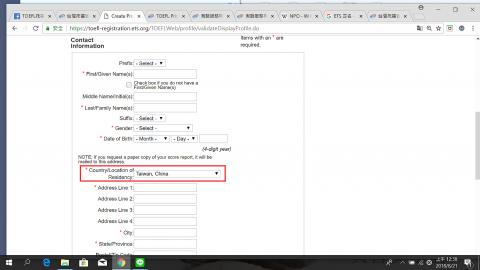Students at a Test of English as a Foreign Language (TOEFL) cram school in Taipei said they were upset when they earlier this month found that the US-based Educational Testing Service (ETS), widely known for examinations it develops for students planning to study in the US, including the Test of English for International Communication, Graduate Record Examinations and the TOEFL, has again changed the way it refers to Taiwan on its Web site to “Taiwan, China.”
The school’s owner, who asked to be identified by his English name, Austin Lin, said some of his students discovered the name change when registering this month for a TOEFL test on the ETS Web site.
Lin said the incident surprised him, because he had heard about Chinese students having their US visa applications rejected or their stays cut short after US President Donald Trump took office.

Photo: Screengrab by Sean Lin/Taipei Times
Such incidents were unheard of during former US president Barack Obama’s time in office, he said.
The Trump administration, which generally takes a more confrontational attitude toward China, has reportedly imposed a stricter policy on Chinese students, due in part to Washington’s concern about Chinese students taking technological know-how they learn in the US back to China, which would intensify the US-China rivalry, Lin said.
It is “disappointing” that ETS, as a non-profit organization with an influential role in education, should get involved, he added.
ETS adhering to Beijing’s “one China” principle was likely motivated by the large number of Chinese students studying in the US, Lin said.
According to the Open Doors 2017 Executive Summary published by the Institute of International Education, Chinese students account for more than 30 percent of international students studying in the US.
“China has continually used its economic power to restrict Taiwan’s international space. It is frightening that such efforts have even penetrated higher education,” Lin added.
He said that the government should step up its efforts to retain local talent, saying that China has wooed away some Taiwanese overseas students by offering them high-paying teaching posts after graduation.
Some students at the school said they had filed protests with ETS.
One student, Chen Kuan-hsien (陳冠憲), said he wrote a letter to ETS to protest the name change.
“I protested that I could not find my country on the registration page, and did not know what to select,” Chen said. “Then I saw ‘Taiwan, China’ — that is not my country.”
Another student, Liu Chiang-yi (劉昌邑), said ETS still referred to Taiwan as “Taiwan” on its Web site when he registered last month for the TOEFL.
In 2006, when ETS introduced the Internet-based TOEFL, it also changed the way in which it referred to Taiwan, changing from “Taiwan” to “Taiwan, Province of China,” which triggered widespread protest among test-takers over how the institute ignored Taiwanese sovereignty.
ETS, saying that the first name change was due to “negligence,” eventually changed the designation back to “Taiwan” after the Ministry of Foreign Affairs intervened and asked it to make the correction.

INVESTIGATION: The case is the latest instance of a DPP figure being implicated in an espionage network accused of allegedly leaking information to Chinese intelligence Democratic Progressive Party (DPP) member Ho Jen-chieh (何仁傑) was detained and held incommunicado yesterday on suspicion of spying for China during his tenure as assistant to then-minister of foreign affairs Joseph Wu (吳釗燮). The Taipei District Prosecutors’ Office said Ho was implicated during its investigation into alleged spying activities by former Presidential Office consultant Wu Shang-yu (吳尚雨). Prosecutors said there is reason to believe Ho breached the National Security Act (國家安全法) by leaking classified Ministry of Foreign Affairs information to Chinese intelligence. Following interrogation, prosecutors petitioned the Taipei District Court to detain Ho, citing concerns over potential collusion or tampering of evidence. The

Seventy percent of middle and elementary schools now conduct English classes entirely in English, the Ministry of Education said, as it encourages schools nationwide to adopt this practice Minister of Education (MOE) Cheng Ying-yao (鄭英耀) is scheduled to present a report on the government’s bilingual education policy to the Legislative Yuan’s Education and Culture Committee today. The report would outline strategies aimed at expanding access to education, reducing regional disparities and improving talent cultivation. Implementation of bilingual education policies has varied across local governments, occasionally drawing public criticism. For example, some schools have required teachers of non-English subjects to pass English proficiency

NEGOTIATIONS: The US response to the countermeasures and plans Taiwan presented has been positive, including boosting procurement and investment, the president said Taiwan is included in the first group for trade negotiations with the US, President William Lai (賴清德) said yesterday, as he seeks to shield Taiwanese exporters from a 32 percent tariff. In Washington, US Trade Representative Jamieson Greer said in an interview on Fox News on Thursday that he would speak to his Taiwanese and Israeli counterparts yesterday about tariffs after holding a long discussion with the Vietnamese earlier. US President Donald Trump on Wednesday postponed punishing levies on multiple trade partners, including Taiwan, for three months after trillions of US dollars were wiped off global markets. He has maintained a 10 percent

TRADE: The premier pledged safeguards on ‘Made in Taiwan’ labeling, anti-dumping measures and stricter export controls to strengthen its position in trade talks Products labeled “made in Taiwan” must be genuinely made in Taiwan, Premier Cho Jung-tai (卓榮泰) said yesterday, vowing to enforce strict safeguards against “origin laundering” and initiate anti-dumping investigations to prevent China dumping its products in Taiwan. Cho made the remarks in a discussion session with representatives from industries in Kaohsiung. In response to the US government’s recent announcement of “reciprocal” tariffs on its trading partners, President William Lai (賴清德) and Cho last week began a series of consultations with industry leaders nationwide to gather feedback and address concerns. Taiwanese and US officials held a videoconference on Friday evening to discuss the